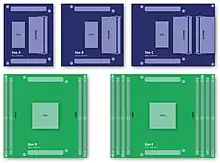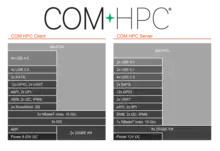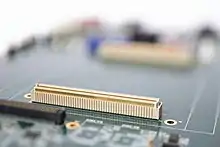





The computer-on-module for high performance compute (COM-HPC) form factor standard targets high I/O and computer performance levels. Each COM-HPC module integrates core CPU and memory functionality and input and output including USB up to Gen 4, audio (MIPI SoundWire, I2S and DMIC), graphics, (PCI Express) up to Gen. 5, and Ethernet up to 25 Gbit/s per lane. All I/O signals are mapped to two high density, high speed and low profile connectors on the bottom side of the module. COM-HPC employs a mezzanine-based approach. The COM modules plug into a carrier or base board that is typically customized to the application. Over time, the COM-HPC mezzanine modules can be upgraded to newer, backwards-compatible versions. COM-HPC targets Industrial, Military/Aerospace, Gaming, Medical, Transportation, IoT, and General Computing embedded applications and even scales up to RAM and performance hungry server or edge server applications.
History
The PICMG work-group officially started in October 2018. The hardware specification passed the PICMG member review in December 2020. The official release was expected for January 2021.
Types
There are 2 different pin outs defined in the specification.
| IO Type | Client Pinout | Server Pinout |
|---|---|---|
| PCIe | 49 (1 BMC dedicated lane) | 65 (1 BMC dedicated lane) |
| NBASeT | 2 | 1 |
| 25 Gigabit Ethernet KR | 2 | 8 |
| USB4 (Can also be used for USB 3.x or USB 2.0) | 4 | 2 |
| USB 2.0 | 4 | 4 |
| DDI (Digital Display Interface for HDMI or DisplayPort) | 3 | 0 |
| eDP or MIPI DSI (for flat panel displays) | 1 | 0 |
| MIPI SoundWire or DMIC | 2 | 0 |
| I2S or MIPI SoundWire | 1 I2S (or 2 Soundwire) | 0 |
| MIPI CSI-3 (CSI-2 also supported) | 2 | 0 |
| SATA | 2 | 2 |
| GPIO | 12 | 12 |
| UART | 2 | 2 |
| IPMB | 1 | 1 |
| eSPI (includes 2 Chip Select Pins) | 1 | 1 |
| SPI (for boot devices) | 2 | 2 |
| GP_SPI (includes 4 Chip Select Pins) | 1 | 1 |
| I2C | 2 | 2 |
| SMB | 1 | 1 |
Note 1: The DC power input for Client Type Modules is defined as wide range 8-20 Volt input.
Note 2: The DC power input for Server Type Modules is defined as 12V only (11.4-12.6 Volt) input.
Size
The specification defines 5 module sizes: The sizes A, B and C are typical Client Type sizes.
- Size A: 95 × 120 mm (3.7 × 4.7 in)
- Size B: 120 × 120 mm (4.7 × 4.7 in)
- Size C: 160 × 120 mm (6.3 × 4.7 in)
The larger D and E sizes are typical Server Type sizes to support full size DRAM modules
- Size D: 160 × 160 mm (6.3 × 6.3 in)
- Size E: 200 × 160 mm (7.9 × 6.3 in)
Specification
The COM-HPC specification is hosted by PICMG. It is not freely available but may be purchased from the PICMG website.[1] PICMG provides a preview version for free download.[2] The COM-HPC hardware specification will be released Jan 2021. Further COM-HPC related documents will be released in 2021
- Carrier Board Design Guide for Ethernet KR
- Full Carrier Board Design Guide
- Platform Management Specification
- Embedded EEPROM Specification (EEEP)